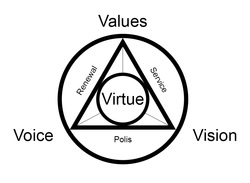About our Founder
|
Dr. Bill Grace founded the Center for Ethical Leadership in 1990 to be a “catalyst for creating a just society.” Feeling the call at age eight, Bill’s first social justice action was to pass out fliers for a mayoral candidate who wanted to be of service to the poor. When he was thirteen, he organized a campaign to pick up litter. He was not just talking about it but was doing something.
Bill entered the field of higher education planning to shape a generation of leaders. He pursed a doctorate to learn how people put their passion for social justice into action. His doctoral research focused on ethical leadership which led to a study on men and women in the Puget Sound region identified as ethical leaders. How did they become ethical leaders? How did they act as ethical leaders? What sustained them? These rich ethnographies revealed powerful influences that helped people form as ethical leaders. A common theme was an eye-opening experience at a young age. One woman recalled visiting the site of the Battle of Verdun in France as a child. The fields were covered with crosses of soldiers who had fallen in the battle. Allied crosses were white and enemy crosses were black. This contrast was jarring, and on the flight home she wrote a poem in which she imagined it began to snow and all the crosses turned white. What would a world look like where we didn’t have enemies? This young girl went on to lead school desegregation in Puget Sound schools. From these stories, Bill created the 4-V model of ethical leadership. The Vs include values, vision, voice, and virtue. After completing his PhD, Bill shifted his classroom from the academic to the community by founding the Center. From the beginning, the Center prepared leaders who “used values, vision, and courage to critique what needed to be critiqued and imagine what needed to be imagined.” The Center quickly grew from serving the Puget Sound to working nationally, particularly though strong partnership with the W.K. Kellogg Foundation (Kellogg Leadership for Community Change). We developed additional concepts of Gracious Space, collective leadership, and creative ways to convene highly diverse groups of people. Bill stepped down from the Executive Director role in 2005 and continues to teach and spread ethical leadership in the community. |
"I've cared about these issues for as long as I can remember." |

